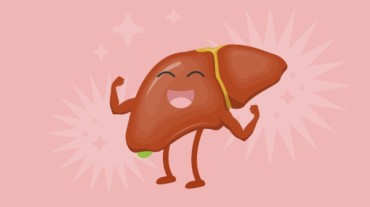
Health is serious business and especially after Covid-19, we all know how important it is to take care of it. Did you know that the liver is the second largest and the most complex organ in the body after the brain? Across the globe, April 19 is marked as the World Liver Day. It is basically to remind ourselves about taking care of our liver and how important it is for a healthy life.
It is commonly believed that alcohol is harmful for the liver. And this is where all the talk of liver is focused around. But there is more to the liver than just alcohol.

These days LFT or Liver Function Test is often the recommended test if one goes for routine blood test. LFT gives an indication about the health of the liver. However, you can skip the testing part if you just take care of what you eat and drink, and how you maintain your body.
Your liver is one of the most important organ in the digestive system. Broadly speaking, liver performs five major functions including filtration, digestion, metabolism and detoxification, protein synthesis, storage of vitamins and minerals.
Liver filters the blood coming from the digestive tract, before passing it to the rest of the body. It regulates the chemical levels in your blood and excretes a product called bile. This helps carry away waste products. The production of bile also breaks down fats in the small intestine during digestion. All the blood leaving the stomach and intestines passes through the liver.
It enables the production of certain proteins for blood plasma and also produces cholesterol and special proteins to help carry fats through the body.
So it is not hard to emphasis the importance of liver.

If the liver is not functioning properly, it can impact your skin and eyes that start appearing yellow, which is also the sign of jaundice. Feeling excessively itchy, could also be a sign that the liver has a problem. And if your stomach starts paining or you get abdominal pain and swelling, you know the problems could be related your liver.
In addition, if you get swelling in your legs or ankles, it could be liver-related too. Continual exhaustion or nausea or vomiting are also associated with issues related to liver problems. Hepatitis and non-alcoholic fatty liver are the most common causes of liver diseases.
“The liver is a vital organ. Its main job is to filter the blood coming from the digestive tract, before passing it to the rest of the body. Excessive alcohol intake, infection by hepatitis B and C virus, diabetes, certain drugs and biliary diseases, may cause liver fibrosis. Our faulty lifestyle also leads to deposition of fat in liver,” says Dr Amit Miglani, Director, Gastroenterology, Asian Hospital.
Select Topics of your interest and let us customize your feed.
PERSONALISE NOWSometimes, liver damage generates pain in body parts including headaches, stomach, specially legs and ankles. Since the liver has no pain receptors, surrounding tissues and other areas of the body like the neck and shoulders may also hurt. But to find out what is going on with your liver, see a doctor.
Also Read: Hear out! 11 signs that tell your liver is crying for help

“Normally, most liver disease patients would require undergoing a liver biopsy to look for liver fibrosis. In Fibroscan, an ultrasound-like probe is placed on the skin over the liver area, just by pressing a button the ultrasound probe sends a shear wave in to the liver and detects the stiffness of the liver.
“Fibroscan will be useful for all patients suffering from a chronic liver disease such as hepatitis B, hepatitis C, non-alcoholic fatty liver disease, chronic hepatitis and cirrhosis. The test takes only 5—7 minutes to perform, it is significantly less expensive than liver biopsy, and it has not been associated with any side effects. After the diagnosis, a patient can immediately go back to home as there is no cutting, no anesthesia, and the patients don’t even feel any kind of pain,” explains Asian Hospital’s Dr Amit Miglani.
The simplest way to know that liver is a cause of concern is when you start passing dark or yellow coloured urine or your stool is pale.
The liver performs essential functions that are life-sustaining..
“Test yourself for Hepatitis B and Hepatitis C once in lifetime. Take Hepatitis vaccines as these problems can be prevented,” says Dr Pavan Hanchanale. Consultant Liver transplant physician, Gastroenterologist and Hepatologist.

“It just takes a little care of what you eat and how you exercise. But before that, you ought to know what hurts your liver. Well, certainly excessive consumption of alcohol can damage your liver. And with liquor, you must smoking and drugs. They can certainly damage liver cells,” warns Dr Archana Dhawan of Bajaj Nurture Hospital.
Sharing her advice on what to eat and how to take care of your liver, Dr Dhawan adds, “Foods containing high calorie and saturated fat, refined carbohydrates are avoidable. They may be tasty, but you should know what you are getting into. So things like white bread, white rice and regular pasta and sugars, if consumed, should only be consumed at irregular intervals. Burgers have become a common item on your menu. It is hard to resist the temptation of a yummy cheese topping pizza with soft drinks too, but you should know where to draw the line.”
You can start eating liver-friendly foods that have a lot of fiber such as fresh fruits, whole-grain bread, rice, and cereals such as quinoa, millet and buckwheat. Even garlic is good for your liver.
“Don’t put too much pressure on your digestive system and consume healthy foods. These foods may appear unappealing, but that’s the deal. Look at eating green leafy vegetables, broccoli, cauliflower, cabbage, carrot, apple, pomegranate and milk thistle and walnut,” suggests Dr Dhawan.
Also, though lemon prices have hit the roof, lemon and lime juice are easy on your liver. And if you are a tea or coffee drinker, it’s okay to have a cup or two but just don’t incessantly keep them coming to your table.
Should we stop complete alcohol consumption? To that, Dr Dhawan says, “If you have to drink alcohol do so in moderation or quit completely.”
If you are obese, the fat and toxins build up in the liver, leading to slow metabolism of the body due to which fat also starts depositing in other parts of the body, causing weight gain. For a healthy liver, you also need to lose weight.

According to Dr Hanchale, “A healthy lifestyle means healthy liver. You must regularly exercise for 45 minutes a day. Consuming low fat, low carbohydrates food will keep your liver healthy. A fatty liver can be reversed with exercise, and a hypo-caloric low fat diet. A fatty liver is not normal. Go for regular visits with your liver specialist.”
Don’t reach a state where your liver fails. If you take care of what you eat, drink and work or exercise, chances are that your liver health may not let you down.